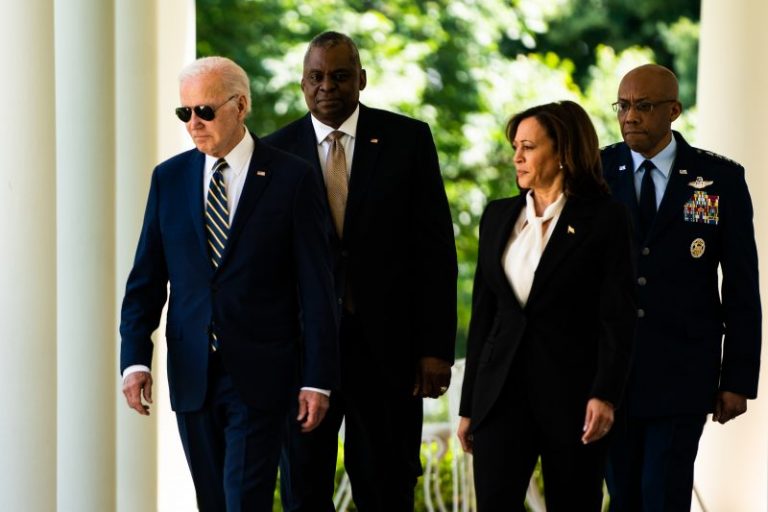The White House said Tuesday that President Biden will nominate a new Pentagon policy chief, a position the administration deems central to navigating challenges posed by China and Russia but one at risk of encountering the same standoff with congressional Republicans that has stymied the confirmation of other defense nominees.
Officials said the administration would send the Senate Biden’s selection of Derek Chollet, who now serves as counselor to Secretary of State Antony Blinken, to become undersecretary of defense for policy.
Biden’s nomination of Chollet to replace Colin Kahl, who stepped down this month, comes amid a feud over abortion policy that has resulted in the stalling of hundreds of nominees for military and defense positions, including Biden’s pick to head the Marine Corps. If the impasse continues, it could result in other high-level vacancies in coming months, including the military’s most senior position, chairman of the Joint Chiefs of Staff.
Sen. Tommy Tuberville, an Alabama Republican who sits on the Senate Armed Services Committee, imposed the hold in protest of an administration policy that enables the Pentagon to reimburse service members for travel expenses required to access abortions and other reproductive care if they are stationed in states where, in the wake of the Supreme Court’s decision to overturn Roe v. Wade, such procedures are difficult or impossible to obtain.
Tuberville has said the agency’s “radical” policy exceeds administration authority. “We are here to make the law, not the Pentagon,” he said last week.
While many Republicans sympathize with Tuberville’s views on abortion, influential lawmakers including Senate Minority Leader Mitch McConnell (R-Ky.) have said they do not back delaying military nominees. Tuberville has said the Senate could hold individual votes for nominees, which critics reject as onerous and time-consuming.
While Biden and other Democrats have warned that the hold could damage U.S. security and further politicize the military, Tuberville has refused to abandon his position despite administration officials’ defense of the policy and appeals from Defense Secretary Lloyd Austin. The dispute casts a shadow over the largely bipartisan cooperation that characterizes support for defense spending and many military initiatives.
It’s not clear whether the impasse can be resolved before it affects Chollet, whose résumé includes a host of key national security roles such as assistant secretary of defense for international security affairs; senior director for strategic planning on the National Security Council; principal deputy director of the State Department’s policy planning office; and speechwriter to then-U.S. Ambassador to the United Nations Richard C. Holbrooke.
Chollet is expected to remain in his State Department role until he is confirmed. As the department’s counselor, he has advised Blinken on issues including China’s projection into the South China Sea and attempts to deepen Israel’s normalization with Arab states.
When Chollet served as a senior Pentagon policy official under then-Defense Secretary Chuck Hagel during the Obama administration, he often traveled as part of Hagel’s entourage on foreign trips, providing input on the U.S. response to issues including China’s military rise and the violent ascent of the Islamic State.
Hagel, a onetime Republican senator from Nebraska, said that he saw in Chollet — a fellow Nebraskan — a combination of expertise and modesty. “That’s one of the things I’ve always appreciated about him, because he does have a lot of ability but he can handle that very well,” Hagel said. “He gets along with people.”
Eric Edelman, who was undersecretary of defense for policy during the Republican George W. Bush administration, said that while Chollet had served under Democratic presidents, they both understood that “there’s much more continuity than difference between administrations because they’re all wrestling with the same problems.”
Current and former officials stress the centrality of the undersecretary for policy position, often described as the Pentagon’s No. 3 job, which oversees a sprawling network of regional and topical offices and several agencies. It is known for being a particularly grueling position given the urgency and unpredictability of military operations and global security threats.
“There’s nothing that doesn’t eventually land, or initially come out of, that office that DOD does,” Hagel said, using an abbreviation for the Department of Defense. “That’s strategy, that’s implementation, that’s everything. … And that’s why every secretary really relies on that undersecretary and his or her team.”
In his previous Pentagon policy role, Chollet also worked extensively with Austin, who at that time was a four-star Army general serving as the head of U.S. Central Command.
As Austin has done repeatedly, Pentagon deputy press secretary Sabrina Singh urged Tuberville to end his hold on nominees, which administration officials say has plunged hundreds of officers and their families into a state of uncertainty. A group of Democratic senators appealed to McConnell on Monday to increase Republican pressure on Tuberville to soften his position.
“It is essential that the Department of Defense have a Senate-confirmed undersecretary for policy as this role is the key policy adviser to Secretary Austin and provides vital strategic guidance in support of U.S. national security interests worldwide,” Singh said.
Edelman said that having a Senate-confirmed individual in the job would provide additional heft at a moment when the Pentagon is seeking to navigate tensions with Russia over the war in Ukraine and with China amid that country’s rapid military development, in addition to threats posed by North Korea and Iran.
Following Kahl’s departure this month, his onetime deputy, Sasha Baker, is serving in the role on an interim basis.
“The United States arguably is now facing perhaps the most complex set of national security challenges it’s ever faced,” Edelman said. “The idea that you would go for some long period of time without the third-ranking policy person in the Pentagon confirmed is, I think, highly irresponsible.”

